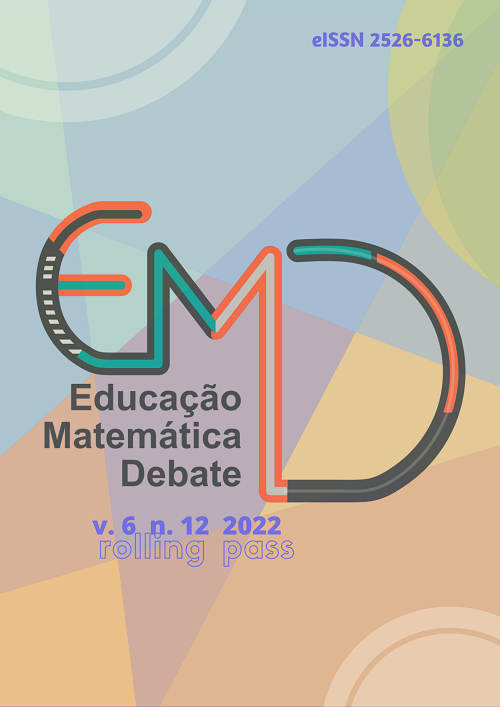WebQuest methodology in Mathematics classes in a Covid-19 pandemic context
DOI:
10.46551/emd.v6n12a08Keywords:
WebQuest, Covid-19, TIDC, Remote Teaching, MathematicsAbstract
The teaching of Mathematics in the remote classroom scenario, due to the Covid-19 Pandemic, has involved “arrangements” in teaching activities, from “how to teach” to “how to evaluate” student learning. This work is a qualitative research of exploratory type, which aimed to investigate how the use of the WebQuest methodology can help the mathematics teacher. The results indicate, on the one hand, that using the WebQuest methodology contributes to the students' learning process. On the other hand, it allows students to communicate with the teacher and develops the ability to learn from investigation and collaboration with other students.
Downloads
References
BACICH, Lilian. WebQuest: como organizar uma atividade significativa de pesquisa. Inovação na Educação (blog), São Paulo, 22 mar. 2020.
BARATO, Jaime N. Avaliação autêntica e rubricas. Brazil Document, 2005. Disponível em https://jarbas.wordpress.com/2018/07/31/avaliacao-autentica-e-rubricas; acesso 13 mar. 2022.
BARROS, Marcos Alexandre de Melo. Aprendizagem móvel no ensino de ciências: o que pensam nossos alunos sobre a nova modalidade de formação? In: CONGRESSO INTERNACIONAL SOBRE INVESTIGACIÓN EN DIDÁCTICA DE LAS CIENCIAS, X, 2017, Sevilha. Anais..., 2017, p. 5165-5170.
BORGES; Tiago Silva; ALENCAR; Gidelia. Metodologias ativas na promoção da formação crítica do estudante: o uso das metodologias ativas como recurso didático na formação crítica do estudante do Ensino Superior. Cairu em Revista, Salvador, v. 3, n. 4, p. 119-143, jul./ago. 2014.
BOTTENTUIT JUNIOR, João Batista. Metodologia WebQuest na formação inicial docente: uma experiência com alunos de Licenciatura em Pedagogia da UFMA. Tecnologias na Educação, Belo Horizonte, v. 9, n. 19, p. 1-13, jul. 2017.
BOTTENTUIT JUNIOR, João Batista; SANTOS, Camila Gonçalves. Revisão sistemática da literatura de dissertações sobre a metodologia WebQuest. Revista Educa Online, v. 8, n. 2, p. 1-42, 2014.
BRASIL. Ministério da Saúde. O que é o COVID-19, 2021. Disponível em https://www.gov.br/saude/pt-br/coronavirus/o-que-e-o-coronavirus; acesso 22 de out. 2021.
COSTA, Paulo da; BIANCHINI, David. Caracterização da demanda futura de usuários da internet no Brasil: uma contribuição para o desenvolvimento de políticas governamentais de inclusão digital e acesso a internet. Journal of Information Systems and Technology Management, v. 5, n. 1, p. 135-162, 2008.
DODGE, Bernie: Some thoughts about WebQuests. 2008. Disponível em https://webquest.org/sdsu/about_webquests.html; acesso 31 mar. 2022.
GRAY, David. Pesquisa no mundo real. Tradução de Roberto Cataldo Costa. 2. ed. Porto Alegre: Penso, 2012.
MERCADO, Luis Paulo Leopoldo; VIANA, Maria Aparecida Pereira. (Org.). Projetos utilizando internet: a metodologia WebQuest na prática. Maceió: Q Gráfica/Marista, 2004.
OLIVEIRA, Vania Sara Doneda de; BASNIAK, Maria Ivete. O planejamento de aulas assentes no ensino exploratório de Matemática desenvolvidas no ensino remoto de emergência. Educação Matemática Debate, Montes Claros, v. 5, n. 11, p. 1-26, 2021.
PRENSKY, Marc. Digital natives, digital immigrants. On the Horizon, v. 9, n. 5, p. 1-6, oct. 2001.
SAMPIERI, Roberto Hernández; COLLADO, Carlos Fernández; LUCIO, María del Pilar Baptista. Metodologia da Pesquisa. Tradução de Daisy Vaz de Moraes. 5. ed. Porto Alegre: Penso, 2013.
SANTOS, Edméa. Pesquisa formação na Cibercultura. Santo Tirso: Whitebook, 2014.
ROCHA, Helena. Conhecimento matemático para ensinar com tecnologia: episódios da prática de uma professora. Educação Matemática Debate, Montes Claros, v. 5, n. 11, p. 1-22, 2021.
ZABALA, Antônio. A prática educativa: como ensinar. Tradução de Ernani Ferreira da Fonseca Rosa. Porto Alegre: Artmed, 1998.
Downloads
Additional Files
Published
How to Cite
Issue
Section
License

This work is licensed under a Creative Commons Attribution-NonCommercial-ShareAlike 4.0 International License.





















